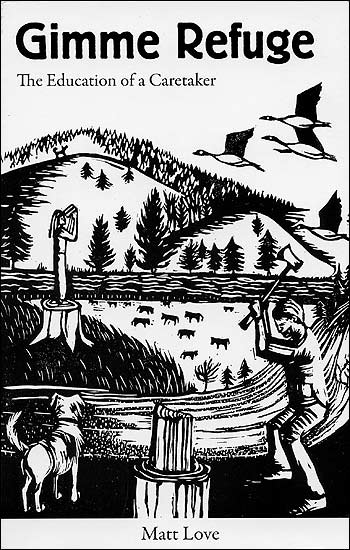
Lost and Found in the Sanctuary
Matt Love’s Gimme Refuge finds inspiration on the Oregon Coast
by Suzi Steffen
 |
A certain type of dude will proclaim that Portland is dead — maybe because of the coffee shops or because Henry Weinhard no longer has a brewery in Northwest or because hipsters clog what used to be a working-class bar or because there’s traffic to Hillsboro.
Matt Love not only declared Portland dead in the late 1990s; he fled for the Oregon Coast. Love’s Beaver State Trilogy captured a variety of fascinating things about Oregon. That includes my favorite, Grasping Wastrels Vs. Beaches Forever, Inc., a book about why Oregon’s beaches are public land instead of gated, fenced and idiotically owned space as in California and Hawaii. But Love never confined himself to one topic — he compiled Red Hot and Rollin’, the story of Portland’s Trail Blazers and how PDX became Rip City, for instance. In the first decade of the 21st century, Matt Love was a publishing fiend, with his Nestucca Spit Press, his blogging and his writing popping up everywhere offline and on.
He’s energetic and certainly persistent. Love quotes an agent who told him, “I don’t think you’re going to be a great writer, though you’re a good writer.” Zing! Hey, why not simply publish that not-great book yourself, then, by founding your own press and publishing at a small printshop in Newport? That’s how the Beaver State Trilogy began. Those who don’t admire Love’s writing style can still admire his abilty to follow through on his vision for producing books about topics that interest him.
In the case of Gimme Refuge: The Education of a Caretaker ($20), the notional topic concerns Love and his wife Cindy’s move from Portland to the Coast and specifically to a national wildlife refuge at Nestucca Bay. The refuge, a failed dairy farm, lies close to Tillamook.
One of the more insistent themes in the book pokes up like the acres of blackberries Love clears from the land: Outdoor manual labor restores and inspires creative types. That theme isn’t unique to U.S. writers, but it surely resonates strongly in a country where Thoreau, Emerson, John Muir and contemporary writers like Edward Abbey passed the theory on to many young people, especially guys. The morality of understanding nature! The superiority of Nature to City, of Field to Dairy Cow Pasture! The true work of restoring native habitat as opposed to the (hard, but unsatisfying, I surmise) drudgery of tricking of young minds into learning!
Yes, Love was (and incidentally, or perhaps not so incidentally, is again) a teacher, an English teacher who lined his late ’90s classroom in Hillsboro with rock posters (he writes it as Rock and Roll) and beanbags, read from his own high school journals and strove mightily to be an heroic figure to his students while inspiring them to become what he thought of as real writers.
That’s a sore point for Love: Teachers inspire students to succeed while sometimes not fulfilling their own dreams. In Refuge, Love writes about his driving desire to be a writer despite his inexperience. As he continued teaching on the coast, he saw himself as someone rapidly burning out.
Things changed. A lot. Most of the book is minutely concerned with everything from Love’s plans for middle-school campouts with the Neskowin Valley School to how many beers he drinks one afternoon while clearing those fucking blackberries. Then, with more endings than even The Return of the King, Love explains what happened after he quit teaching, finished the original manuscript for this book and began writing for publication.
Refuge wants to be a tale of redemption, of a purpose regained in nature. With the many codas, it becomes a much harder and more real story. Much of what occurs after Love becomes “a literary voice, a distinct one for Oregon” (in his words) is not good — divorce, death, development. Tales of redemption work that way sometimes; life isn’t a narrative arc.
While Gimme Refuge has its annoyances (first-person present tense being high on the list), the author also has insight about following dreams and understanding the land on which one lives. Eugeneans surely can empathize with that.
Matt Love and Jon Raymond read at 5:30 pm Saturday, May 22, at Tsunami Books.